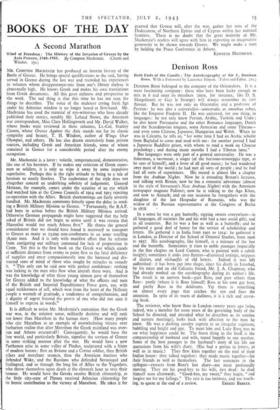BOOKS OF THE DAY
A Second Marathon
Ma. Comvrox MACKENZIE has produced an interim history of the Battle of Greece. He brings special qualifications to the task, having served in Greece during the last war and recorded his experiences in volumes whose disappearance-rate from one's library shelves is abnormally high. He knows Greek and makes his own translations from Greek documents. All this gives richness and perspective to 'the work. The sad thing is that this time he has not seen the things he describes. The voice of the muleteer crying fresh figs under his Athenian window is no longer heard at first-hand. Mr. Mackenzie has used the material of eye-witnesses who have already published their stories, notably Mr. Leland Stowe, the American war correspondent, Miss Clare Hollingworth and Mr. David Walker, whose books were reviewed in these columns, Lt.-Col. Stanley Casson, whose Greece Against the Axis stands out for its classic sympathy and beauty, T. H. Wisdom, author of Wings Over Olympus, and others. He has also drawn extensively from private sources, including Greek and American friends, some of whom remained in Greece for a considerable period after the enemy occupation.
Mr. Mackenzie is a lover: volatile, temperamental, demonstrative, like one of his heroines. If he makes any' criticism of Greek states- men or soldiers, it is only to wipe it away by some impulsive superlative. Perhaps this is the right attitude to bring to a tale of heroism so nearly flawless. The exuberance of the style does not altogether conceal an underlying sobriety of judgement. General Metaxas, for example, comes under the scrutiny of an eye which had watched him at the Crown Councils of 1914 and 1915 rejecting co-operation with the Allies. British shortcomings are fairly severely handled. Mr. Mackenzie comments bitterly upon the delay in send- ing a British Military Mission to Greece. " Fortunately, the R.A.F. had been in action before the British Military Mission arrived. Otherwise German propaganda might have suggested that the help asked of Britain did not begin to arrive until it was certain that Mussolini would not reach.. Athens first." He shares the general astonishment that we should have found it necessary to transport to Greece as many as 23;00o non-combatants in an army totalling 58,00o men. And it is only with manifest effort that he refrains from castigating our military command for lack of preparation in Crete. Yet this is the first book on the Greek war which stands at sufficient distance from events to point first to the fatal deficiency of supplies and enter compassionately into the harassed and dis- tracted state of mind of those who sought by miracles to remedy it. " This only can be said now with perfect confidence: nothing was lacking in the men who flew what aircraft there were. And it- was the knowledge of what those young airmen gave of themselves for Greece added to the knowledge of what the officers and men of the British and Imperial Expeditionary Force gave, too, with equal recklessness of self, which won from the heart of the Hellenic people a warmth of gratitude, a tenderness of comprehension, and a dignity of regret beyond the power of one who did not earn it himself to express in words."
It is difficult to resist Mr. Mackenzie's contention that the Greek war was, in the strictest sense, militarily decisive and will rank not lower than Marathon in the human story. (How many people who cite Marathon as an example of overwhelming victory over barbarism realise that after Marathon the Greek mainland was over- run and Athens evacuated?) Consequently, he would have the free world, and particularly Britain, signalise the services of Greece in some striking manner after the war. He would have a new Parthenon arise in some valley of Pindus, sculptured with a frieze of modern heroes: first an Evzone and a Cretan soldier, then British pilots and merchant seamen, then the American marines who defended Wake, -and the Russians who defended Sevastopol and Stalingrad, and so through the long list of Allies to the Yugoslays, who threw themselves upon death at the eleventh hour to save their honour. He would have the Greeks receive British citizenship, as the little city-state of Plataea received Athenian citizenship for its heroic contribution to the victory of Marathon. He takes it for
granted that Greece will, after the war, gather her sons of the Dodecanese, of Northern Epirus and of Cyprus within her national frontiers. There is no doubt that the great majority of Mr. Mackenzie's readers will agree with him in expecting an imaginative generosity to be shown towards Greece. We might make a start by holding the Peace Conference in Athens.
KENNETH MATTHEWS.


























 Previous page
Previous page